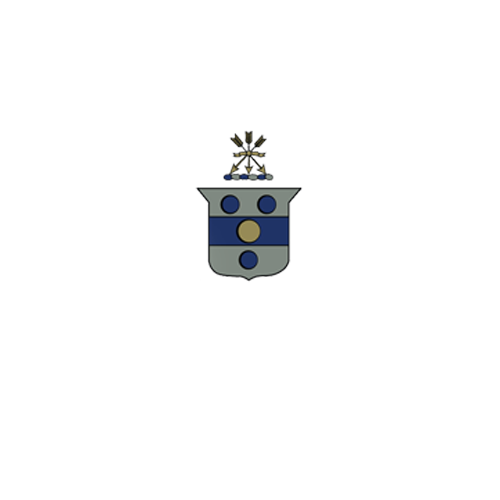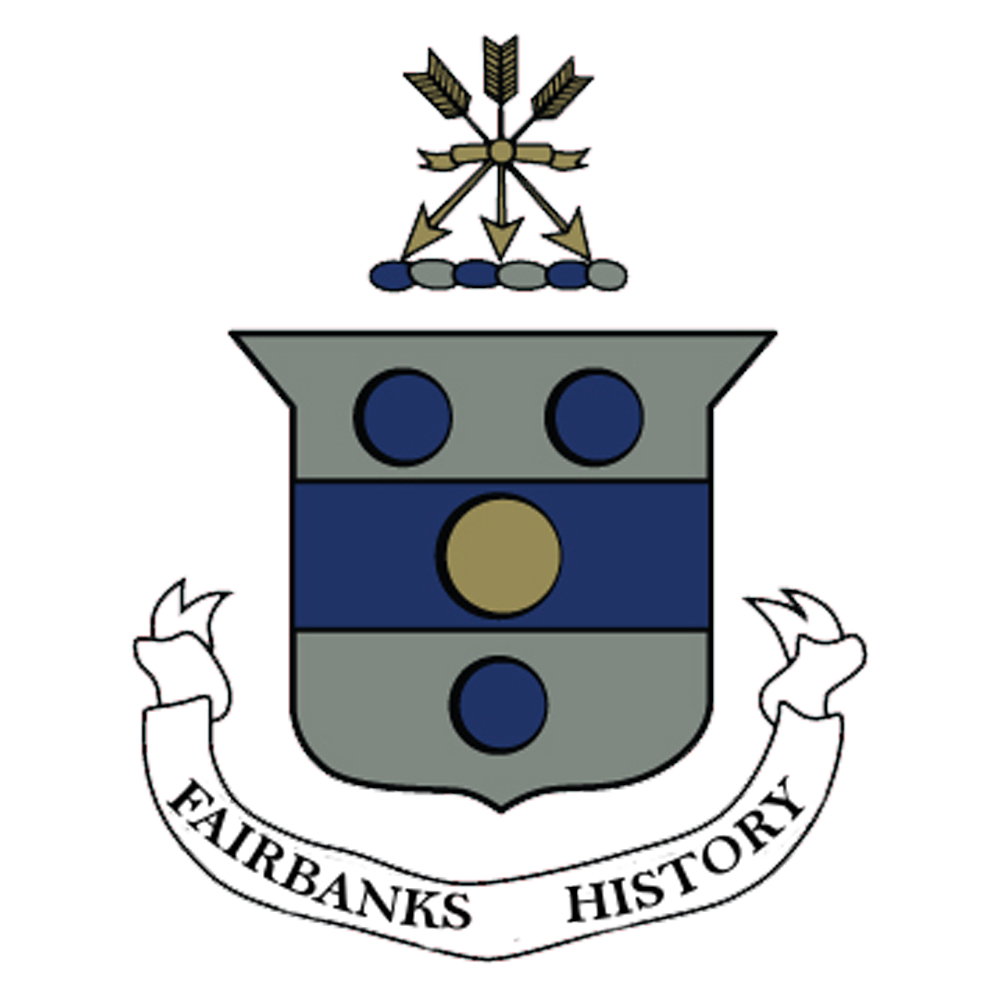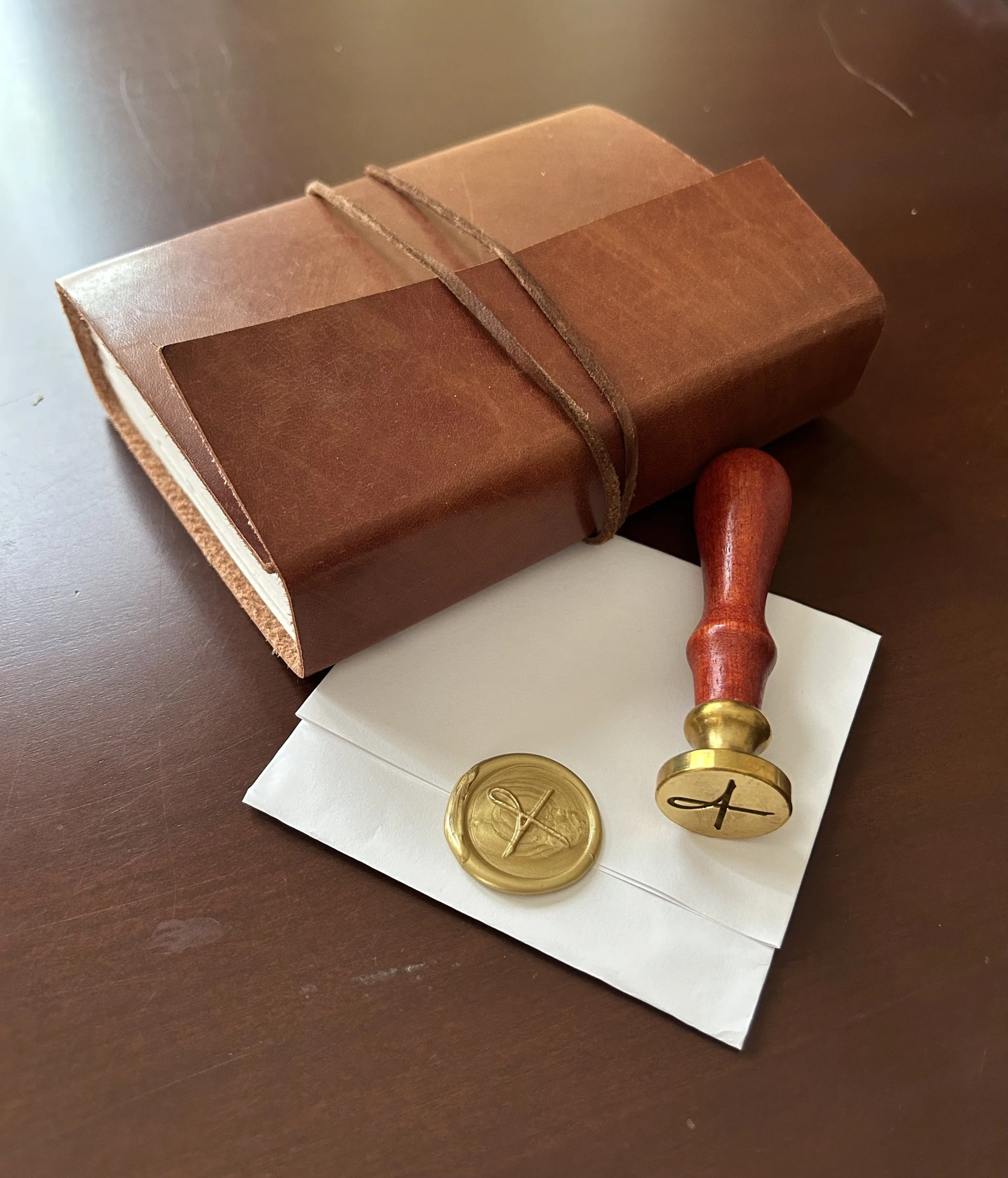Glimpses into "Made to Last Forever": Fairbanks 1600s letters and Fairbanks Revolutionary War Patriots : Associated Letters
Fairbanks wax seal facsimilie taken from script on the his will of 1668.
Glimpes into “Made to Last Forever”
Fairbanks 1600s Letters
Jonathan Fairbanks, the original Fairbanks in this family line to immigrate to Massachusetts Bay Colony between 1633 and 1636 could read and write. In his inventory after death, there were two pairs of glasses and fourteen books. Jonathan was often a surveyor of land and roads in Dedham, indicating he had math skills. He also worked for an English merchant, Richard Hartley, and kept his ledger.
Jonathan’s seal is scripted at the end of his 1668 will. He would have used the seal to secure private letters which he wrote.
Unfortunately we don’t have any writings from Jonathan Fairbanks, no letters, no diaries, no notes. But there were two letters written to Jonathan after he came to the Massachusetts Bay Colony. These letters give us a glimpse into Jonathan Fairbanks’s character and his relationships.
Jonathan received a letter about fourteen years after he settled in Dedham, in 1650. The letter came from the executor, James Platts, of the will of George Fairbanks in Sowerby. George is believed to be Jonathan’s older half-brother. The letter was addressed:
George Fairebanke his
last Will &
Testmen’ t
For his Louvinge Cusen Jonathan
Fayrebanke in new Ingland,
these
Deliu’r
Sowerby, was Jonathan’s home village before emigrating to New England. His half-brother was believed to be in Thornton-in-Craven parish at the Hague prior to Jonathan leaving for New England. Much of Jonathan’s extended family still lived in Sowerby. A Jonathan Fairbanks is named in George’s will, but it is a different cousin, Jonathan, in England.
There is no evidence there was a letter included with the will. However, there is an interesting coincidence. There is a brass sundial that is kept in the Collections of the Dedham Museum & Archive that belonged to Jonathan and Grace Fairbanks of Dedham. It was donated in 1892 by Miss Olive Fairbanks. It is inscribed with the date 1650 and London. Could this have accompanied the will that was sent to Jonathan? The will can be found in the New England Historical and Genealogical Register, July 2012, page 167-168.
The second letter sent to Jonathan in Dedham came from a Richard Hartley. Richard was an English merchant that came to Dedham about 1653. Like Jonathan, he was from West Yorkshire, but a different town, Stansfield. He occupied the small home of another man in Dedham for a short time. That man, James Draper, was also from Stansfield, England.
In 1658, Jonathan received a letter from Richard Hartley who had moved his primary business to New London in 1656. Hartley had procured a wharf there for easier commerce. This letter tells us that Jonathan is keeping Mr. Harley’s ledger, collecting debts from Dedham residents, and making business deals for Mr. Hartley in the Dedham area. For Jonathan’s keeping, Mr. Hartley’ ledger Jonathan was given a bedstead and a hoe from the house Hartley had occupied at Dedham. A bedstead would have been considered a very fine gift at that time.
The letter was a short 5 x 7 1/2 inches paper folded to 2 1/2 inches square and sealed with red wax seal, a heart in a square. This letter was found in the Central Library and Archive of Halifax, England. It has an incomplete citation: New England Register 7. 130. Richard Hartley died in 1662.
From these letters, it appears that Jonathan was not named in the will of his half-brother George, but perhaps received a present instead, a bronze sundial. From the Richard Hartley letter, we could deduce that Jonathan was a respected man for his knowledge, skills, and rapport with other men in Dedham. Jonathan is documented frequently in the Dedham Town Records, working with others, surveying lands and roads. He signed a document of support for the Massachusetts Bay Colony government. Jonathan didn’t write his own will in 1668. It was customary to have someone else write the will. These written documents and his inventory of his estate give us a good idea of what kind of man Jonathan Fairbanks was.
These references are used in the book, Made to Last Forever: A Family. A House. A Nation.” by Sharmin Fairbanks McKenny, that will be for sale on October 1, 2025. You will find these and other facts of the original Fairbanks’s lives woven into a story of family relationships, trials, and triumphs as they help develop our new nation. Be sure to sign up for the monthly newsletter to the right to be notified of updates on the book.
Fairbanks Revolutionary War Patriot Project
Letters of the Revolutionary War
Communication is so important in relationships. Our servicemen wait and look for letters when they are far away from home. So did the Patriots during the Revolutionary War. Has anyone found letters, diaries or artifacts of any Fairbanks Revolutionary Soldiers. I have not. However, we can assume that the soldiers that camped together and fought under the same conditions may have expressed the same feelings and fears as their fellow soldiers.
At the website Museum of the Revolutionary, there are transcripts of letters written by two Davenport brothers from Dorchester, Massachusetts, who were in the Revolutionary War. They were not Fairbanks descendants, but they shared some of the same locations and experiences as some of the Fairbanks Patriots during the war. There are 17 letters remaining from these two brothers. They can be found under The Davenport Letters
The brothers, Isaac and James Davenport, were at Valley Forge and West Point with some Fairbanks at the same general time. This does not mean they were in the same regiments. James Davenport was in New Windsor three years after a Fairbanks was dischaged from the Head Quarters there.
The first letters were from Isaac Davenport at Valley Forge on January 15th and June 13th of 1778. Washington’s Continental Army camped at Valley Forge from December 19, 1777 to June 19, 1778. This third winter encampment was brutal like many of the other winter encampments. It was situated in farm fields within reconnaissance distance from Philadelphia that had been taken over by the British. Ten Fairbankses were in the Continental Army during the winter of 1777 to June 1778. These Fairbankses would have endured some of the same experiences as Isaac Davenport and his brother who was also there.
In January of 1777, twenty-three year old Isaac Davenport was at Valley Forge with his brother James. Isaac wrote to another brother at home that he was not receiving letters though he had written many. He said the camp was very bad and their fare very hard and they hoped for better times. The Davenports and Fairbanks were living in the woods in huts they built. Isaac was at a campfire when he wrote and again begged for letters from home.
The next letter Isaac wrote was on June 13, 1778, just before Washington’s men left Camp Valley Forge. Isaac writes that both he and James were well and consider that a blessing. Isaac tells that the British are moving out of Philadelphia, so those at Valley Forge would do the same.
Of the Fairbanks that were in the Continental Army, Abiel, a private, from Lancaster died before arriving at Valley Forge. Luther Fairbanks from Lancaster was discharged before camping at that winter camp. The surgeon’s mate, George Fairbanks, experienced Valley Forge and resigned on April 10, 1778, before the troops left the camp. Seven Fairbankses remained to march out of Camp Valley Forge with George Washington’s troops.
Isaac Davenport was killed in the “Baylor Mascacre” in September of 1778. The remainder of the letters were from his brother, James Davenport. James wrote five letters from West Point, New York, between May 22, 1780 and June 1782. A Fairbanks was at West Point just after James left. Asa Fairbanks (#129, page 170 of the Lorenzo Sayles book) was at West Point on August 20, 1782.
James Davenport was 18 years old when he enlisted. He left memoirs of Valley Forge which states he was inoculated for smallpox and “had a siege of it…” On May 22, year unknown, James says he is almost starved because the rations were small, a half pound of bread and “a little stinking shad a day” and a gill of pease. He, like his brother, asked for letters. Each of the brothers closed their letter with… “until Death.”
On April 16, 1780, James had been home on furlough and just returned to Camp West Point. He had little to say except that he would make the best of a “Bad Bargain.” Perhaps he didn’t know that the major part of Washington’s Continental Army was at Jockey Hollow in New Jersey, a winter camp nearly as bad as Valley Forge had been. Many of the Fairbankses could have been at Jockey Hollow.
The Continental Soldiers were entitled to food, clothing and payment for their military services, but the funds were meager and they often didn’t get what they were promised. In his January 20, 1781, letter James said he had not been paid for 13 months. He talked about the idea of going out of camp without leave and not coming back. He reported that they were getting a pound of beef and bread a day. The other winter camp, Camp Jockey Hollow, had a lot of deserters, poor rations and smallpox also.
Prior to writing this letter on May 14, 1782, James had witnessed a defeat of some British soldiers The Patriots along with the French formed two parallel lines for the vanquished British to march through in their walk of shame. Humiliated, yet well dressed British soldiers, in powdered wigs, walked by war-torn Patriots with no shoes and rags on their feet. This is worth reading in the prelude to his letter at The Davenport Letters. In his actual letter, James talks of rumors of the war ending. There was a man hanged in camp for mutiny, and there was no money to be had for the soldiers. James had no money to buy more paper to write, but still hoped for letters from home which seem to be sparse.
The next letter was June 26, 1782, James said they had their eye on the enemy in New York while they were in West Point, New York. There was still little in the way of provisions and money, not enough to buy good paper, but there was plenty of work to do. He uses the words Molls and Jos for girls and guys and says that they were often talked about by the soldiers.
In 1780, Asa Fairbanks, #129, page 170 of Lorenzo Sayles’ book, reenlisted for six months and served a part of the time at West Point. He was there when Benedict Arnold tried to hand it over to the British. Asa is descended from Jonathan I, George II, Eliesure III, Eliesur IV, Evenezer V. Perhaps Asa experienced some of what James Davenport wrote to his brother from West Point. There is a more detailed description of Asa Fairbanks on a previous Fairbanks Revolutionary War Patriot blog (see Asa Fairbanks).
James Davenport sent a letter to his brother at home on August 20, 1782. He states there is “strong talk” that the war will end. James was tired of living without real money and sounded as if he might be selling needed belongings. The troops were sporatically getting liquor. It incensed James that the Tories may get their farms back after the war. He found fruits in this season, but wished for the pears from his home in Dorchester, Massachusetts, but no more than he wished for letters from home that continue to be sparse.
James’ last letters in the Davenport Collection of 17 were sent from New Windsor, New York from December 1782 - April 1782. New Windsor, New York was Washington’s last winter camp from October 1782-April 1783. However, it appears that New Windsor was an important base camp prior to when James wrote his letters.
Lt. Samuel Fairbanks was commissioned under Samuel Huntington, Esq., Pres. of the Congress of the United States, at Philadelphia from September 1779, until he was discharged at New Windsor, New York in April 1781. Lt. Samuel Fairbanks was discharged before James Davenport helped set up the winter camp at New Windsor. Lt. Samuel Fairbanks may have had very different responsibilities than young James Davenport during their times at New Windsor. In a later blog, Lt. Samuel Fairbanks will be discussed in more detail.
James Davenport’s letter in December describes setting up the winter camp in New Windsor. His reponsibility was to guard those who were building the huts that contained bunk beds and a fireplace, much like those at Jockey Hollow during previous years. He again complained of not getting letters from home, having only one pound of bread and one pound of beef per day, and no pay. In January, James said they lived in “peace and Poverty” which caused a lot of frustration among the soldiers, but he still felt the cause was worth the hardships. James’ frustration showed in late January as he didn’t believe the war was near over even though that was what was being said. He had been in the service for six and a half years and sometimes felt as if he were a slave.
In February, he again talked of the war ending and a “Publick Jubilee.” He said he was healthy, but camp life was difficult. By March, the winter encampment drug on. James was young, 18 years old when he enlisted. Now, six and a half years later, he felt he gave up much of his young life and romance with the ladies, Molls. With a hearty dose of liquor he shares the men’s camp conversations about the desire of a woman. He didn’t often speak so plainly about that, but said the conversations were frequent.
James’ last letter on April 14, 1783 was written shortly before the Continental Army soldiers began to be discharged. His letters, by then, were traveling within 3 days from New Windsor to Dorchester, taken by private individuals. In this letter, he wrote “Liberty, Peace and Independence forever.” James returned home that year with his noncommissioned officer’s sword and a red British coat. The Davenport Letters. All of the Fairbanks patriots had been discharged from the Continental Army by Dec. 31, 1780.
Summary
You just got another glimpse into how I research the Fairbanks family history. I start by looking for any documentation and facts about the Fairbanks of that time and place. When I exhaust that, I look at other family members, friends, townspeople, events, etc. that might possess some of the same characteristics or situations of the Fairbanks descendants. Here I looked for information about the Fairbanks Patriots. Then I found the Davenport brothers from Dorchester, which would have been very near Dedham. The Davenport brothers wrote first hand accounts of their lives in Valley Forge, West Point and New Windsor. I looked for occasions where the Fairbanks and Davenports were in the same camps at the same time. Their experiences may not have been the same, but, quite possibly, they were similar. From these facts a deeper research can be done with other bits of facts retrieved.









